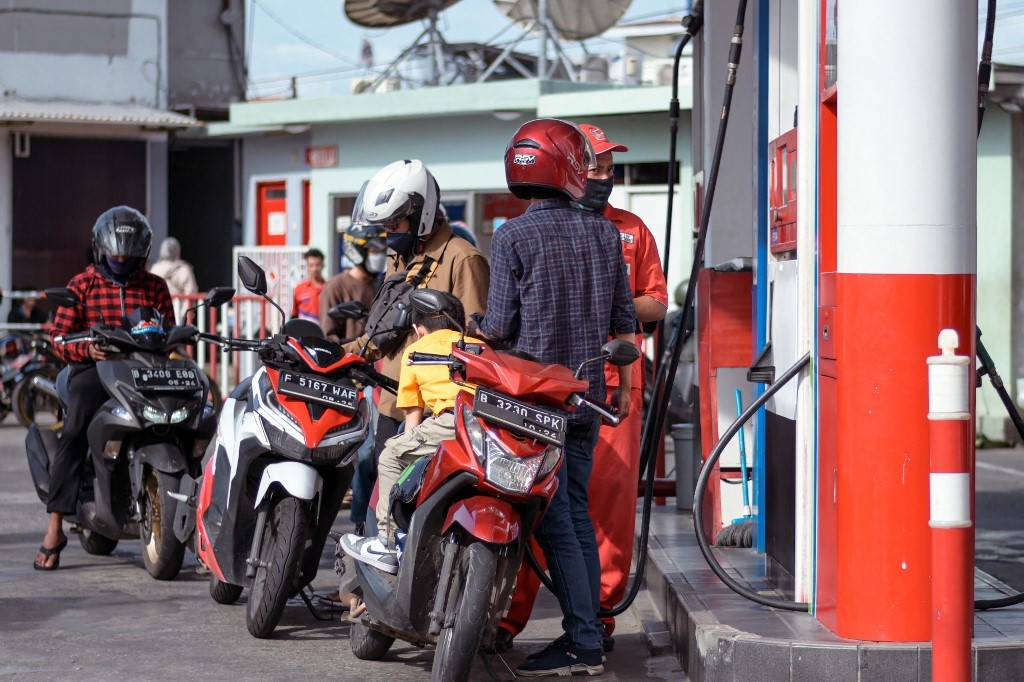News
Government Plans to Limit Consumption of Subsidized Fuels, Again
Tenggara Strategics (The Jakarta Post) September 16, 2024 Motorists queue at a petrol station in Jakarta on Sep. 3, 2022, as the government announced an increase in the price of subsidized fuel from Rp7,650 (US$0.51) to Rp10,000 (US$0.67). (AFP/Bay Ismoyo)
Motorists queue at a petrol station in Jakarta on Sep. 3, 2022, as the government announced an increase in the price of subsidized fuel from Rp7,650 (US$0.51) to Rp10,000 (US$0.67). (AFP/Bay Ismoyo)
The discourse on limiting the use of subsidized fuel brands Pertalite gasoline and Solar diesel has been a long-running debate under President Joko “Jokowi” Widodo’s administration. This time the government plans the limitation of Pertalite to take place on Oct. 1, 2024. President Jokowi’s stance has been indecisive regarding this matter, confusing the public once again.
The government plans to limit Pertalite for cars with a maximum engine capacity of 1,400 cc, motorcycles with a maximum engine capacity of 250 cc and Solar for maximum 2-liter diesel engine capacity vehicles. The implementation of subsidized fuel restrictions was previously scheduled to coincide with Indonesia’s Independence Day, back on Aug. 17, 2024. Despite initial plans, President Jokowi himself delayed the implementation, worrying that it could lower his popularity toward the end of his term.
Newly appointed Energy and Mineral Resources Minister Bahlil Lahadalia has announced plans to implement fuel subsidy restrictions beginning Oct. 1. Even with the new restrictions, there will be no price increases for subsidized fuels. The restrictions will be included in an Energy and Mineral Resources Ministerial Regulation.
The government believes that limiting the purchase of Pertalite fuel will not have a significant impact on consumers’ purchasing power. By implementing stricter eligibility requirements for Pertalite and subsidized diesel fuel Solar, President Jokowi seems to be paving the way for the next government to be able to allocate money for other purposes, especially the budget for the “free lunch” program for students.
The government has set a higher energy subsidies budget for 2025 at Rp 204.3 trillion (US$13.25 billion), up from Rp 186.9 trillion in 2024. But the increase in subsidies will be mainly for electricity, at Rp 90.2 trillion, up from Rp 73.6 trillion, while subsidies for fuels and liquefied petroleum gas (LPG) will remain relatively the same at Rp 113.7 trillion, of which Rp 87.6 trillion will go to LPG, and only Rp 26.7 trillion for subsidized fuels.
President Jokowi explained that this restriction is intended to improve the effectiveness of the state budget while reducing air pollution in Jakarta. Currently, Indonesia uses Euro 4 emission standards, while other countries have used Euro 5 or even Euro 6 standards. Pertalite fuel has a research octane number (RON) of 90 and does not abide by the rules of the Euro 4 standard of RON 91. Pertamina aims to replace Pertalite with a greener option of Pertamax Green 92. The composition of Pertamax Green 92 will be a mix of fuel with RON-90, along with 7 percent ethanol.
A source within the Finance Ministry stated that the plan to limit the purchase of Pertalite fuel has been discussed repeatedly over the past few years. The government’s compensation to Pertamina for producing Pertalite continues to swell year after year as Pertamina struggles to find financing for fuel procurement, the majority of which must be imported.
The main issue is that government’s set price of Rp 10,000 per liter for Pertalite is far below its economic price. Jokowi always hesitates whenever a proposal is raised to increase the price of subsidized, as the decision would be extremely unpopular among the voters.
As a result, Pertamina continues to suffer losses from domestic fuel sales, especially for Pertalite. All these losses burden Pertamina’s cash reserves as there is no direct subsidy from the state budget. Instead, the mechanism is through compensation payments, which requires a time-consuming application and review process.
Pertamina can indeed bear these losses. So far, they have applied a cross-subsidy system, using profits from other areas to cover fuel sales losses. However, this method is slowly reaching its limit. If global oil prices continue to rise, Pertamina's profits from other sectors will not be enough to cover the losses from domestic fuel sales.
Even though oil prices have been relatively stable lately, the fixed subsidy amounts will still not suffice. This is because the government’s set quota on subsidized fuel consumption is often exceeded. The quota covered by the government almost always runs out before the time limit. During cabinet meetings, Finance Minister Sri Mulyani has repeatedly raised concerns about the high compensation costs and the burden of energy subsidies.
Thus, restricting the distribution and purchase of subsidized fuel has become the government’s main option. From the 2025 State Budget draft (RAPBN), the government appears more cautious to prevent the budget from being overwhelmed again. The presence of Thomas Djiwandono as Deputy Finance Minister is said to have made Prabowo Subianto more realistic.
However, there are also concerns within the government that the economy could be further hit if people are unable or struggle to buy subsidized fuel. The consequence of this would be a slow down of economic growth.

